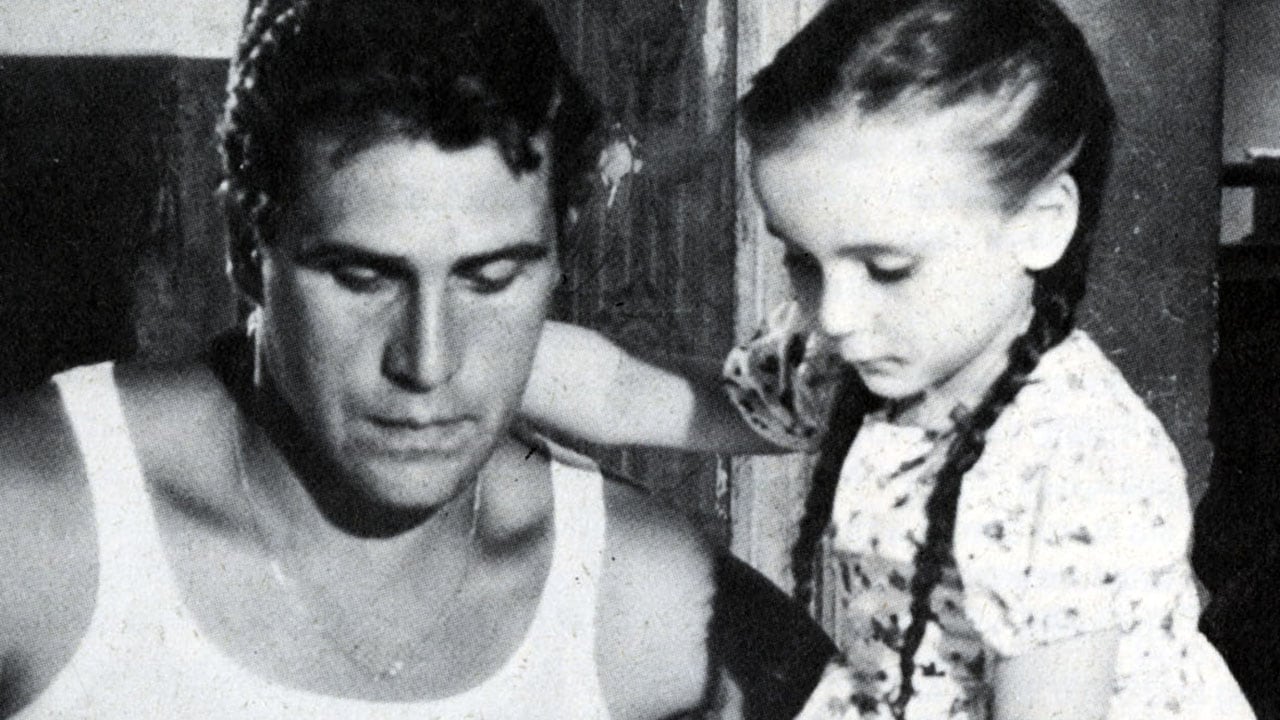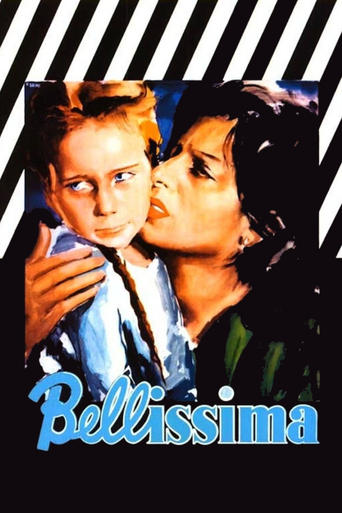

You won't be disappointed!
... View MoreCrappy film
... View MoreBad Acting and worse Bad Screenplay
... View MoreOne of the best movies of the year! Incredible from the beginning to the end.
... View MoreI am a great admirer of Luchino Visconti, so it saddens me to say that I did not like this film. Of course, with an actress of Magnani's quality, you do not walk away empty-handed, she excels in parts, but is ultimately stereotyped by the "earthy Italian female" character, one who remains sexually virtuous in spite of other questionable behavior, and puts herself in unnecessary situations that erode her reputation in the eyes of husband and acquaintances. The script is thin, in spite of interesting asides involving her relationships with child, husband, and would-be lover. B&W photography is standard, downright unimaginative but effective. Acting is the film's best asset but, as far as I am concerned, does not save it - especially because the ending is so obvious and long-winded.It is interesting to compare BELISSIMA with LITTLE MISS SUNSHINE, as both focus on beauty/singing competitions for young girls. Granted, LITTLE MISS SUNSHINE was done 50 years later, but it flows far better and its ramifications are far wider and more meaningful.
... View More'Bellissima' begins with a radio presentation of Donizetti's opera L'elisir d'amore (The Elixir of Love). In it, a poor peasant, Nemorino, falls in love with Adina, a beautiful landowner. He relies on a charlatan's magic potion that he believes will help him to gain Adina's love. We're suddenly interrupted by an announcement of a casting competition for (real-life) director Alessandro Blasetti, who is searching for a child, age 6 to 8, to star in his latest film. 'Bellissima' is heralded director Luchino Visconti's third film and he wastes no time in introducing us to the crazy world of the Italian film industry, where a large gaggle of star struck stage mothers accompanied by their little tots are attempting to get their 'big break' in the movie business.Perhaps the most determined of all the mothers is our protagonist, Maddalena Cecconi, played by subsequent Oscar winner, the superb Anna Magnani. She lives in a working-class tenement with her equally 'passionate' husband, Spartaco, who both appear to be good parents to little Maria, the unprecocious child who Maddalena is convinced is the next 'Shirley Temple'. Like Nemorino in Donizetti's opera, Maddalena needs a magic potion to escape the drab existence which she perceives is her life—and that magic potion is the film contract which will enable her to live vicariously through her daughter's success. If Spartaco tries to convince his obsessed wife that motion pictures are just a 'fantasy', Maddalena will have none of it—every week there's another Hollywood picture projected on the big screen in the building's courtyard and Maddalena is enraptured whenever a big actor like Montgomery Clift makes his captivating appearance.Back to the initial auditions: Maddalena finally finds little Maria with her soiled dress by a pool—the rest of the stage mothers have already been let in to the studio and a seemingly kind director's assistant, Alberto Annovazzi, manages to get Maddalena and Maria inside the doors, despite the late hour.We break into Act II when Maria is chosen for a call back audition. Visconti doesn't only affectionately ridicule the naïve Maddalena but Italian society in general, obsessed with their own self-interest. It begins with an older washed-up actress who shows up at Maddalena's door insisting that she has the ability to polish the little one's act and ensure she wins the film competition. Later Spartaco kicks the woman out of the house, but up until that point, Maddalena doesn't question her credentials, only hoping that the woman's instruction will give her little one, an edge.Due to her naivety about the film business, Maddalena is often gullible with those she interacts with; but she's also stubborn and aggressive. The obsessed mother butts heads with a photographer referred to her by Annovazzi and a dress maker, who hilariously doesn't buy into taking injections for preventative health (Maddalena works a nurse and gives injections to diabetics). More funny stuff: a hairdresser allows his young son to cut Maria's pigtails and Maddalena expects instant results during initial ballet lessons (dig the crazy ballet director's absurd dance across the studio floor!). There's also a great scene where Maddalena accuses Spartaco of beating her—the gossipy neighbors get in on the act, and take Maddalena's side (in contrast to their constant criticism of her).Visconti throws in a nice twist when Annovazzi hits Maddalena up for the 50,000 lire which was going to be used for the purchase of a new house. Annovazzi tells Maddalena he'll use the money to make the necessary connections to ensure Maria gets the screen test. The twist is that Maddalena doesn't seem to mind that he used most of the money to buy a scooter for himself. And when Annovazzi tries to seduce Maddalena during a visit at her mother-in-law's, Maddalena also isn't perturbed at all—she dismisses it as men's 'typical behavior'.Before the classic denouement, Maddelena meets a woman who she recognizes as a former actress in a couple of director Blasetti's movies. She warns Maddelina that the move business isn't what it's cracked up to be. After acting in two films, she didn't get anywhere, so she took the more mundane job as a film editor. Still, Maddalena is undeterred and believes there's still a chance Maria might be selected. So she finagles her way up the projection room and watches the rushes. To her chagrin, Maria breaks out crying during her screen test. Blasseti's colleagues (including Annovazzi) find this uproarious and burst out laughing. Maddalena confronts the director and chastises him and his colleagues for their bad behavior. Blasseti basically agrees with Maddalena and fires Annovazzi on the spot. But that's not enough to assuage Maddalena's hurt feelings and she storms off.At this point, Maddalena's world is shattered. Sitting on park bench, she clutches Maria and cries out, 'Help'. Back at the studio, Blasseti watches the rushes again and improbably sees a different Maria. Before you know it, the studio executives are offering Maddalena and Spartico a contract for Maria to star in their next picture. But Maddalena, no longer living in the world of illusion, does the 'right thing' and tells the executives that the film business is not for her daughter or for the rest of the family.Most of 'Bellissima' I would describe as comic but there are moments (particularly the ending) which are more touching and poignant. On occasion, the constant bickering between some of the characters, goes on a little too long but for the most part, Visconti's narrative displays brilliant insights into the unfortunate human phenomena known as selfishness. The many layered, brilliant performance of Anna Magnani and the supporting players is the type of acting you rarely see anymore. This is a film that I highly recommend for those who enjoy watching classic cinema.
... View MoreIn a post-war Italy, Maddalena Cecconi (Anna Magnani) is a woman from the lower classes abused by her husband Spartaco Cecconi (Gastone Renzelli), who is obsessed to make her young daughter Maria (Tina Apicella) a star in the cinema industry. She expects a better life for Maria, and she sacrifices her marriage and her savings paying interpretation and ballet teachers, dress, hairdresser and bribe for the small time crook Alberto Annovazzi (Walter Chiari) to make her dream come true. When the director sees the test of Maria, Maddalena realizes the reality and cruelty of the entertainment industry."Belissima" is a beautiful tale of disillusion. Anna Magnani has a magnificent interpretation in a role of a very poor mother and frustrated woman, spanked by her husband, trying to give a better life for her young daughter. Living nearby a movie theater, she sees the opportunity when a famous director is chasing a young talent for his next movie. Her characters gives the best effort within her short culture and vision trying to make her dream comes true, being very touching the moment when her dreams are shattered. The direction of Luchino Visconti is precise and flawless as usual, and the story is very real and credible. My vote is eight.Title (Brazil): "Belíssima" ("Very Beautiful")
... View MoreIf you see only one film by Anna Magnani, see BELLISSIMA. The is "La Magnani" at her comic best. Get the video with English subtitles because even if your italian is good, the verbal onslaught is thick and fast. Preferably one should see this film on the big screen to get the full impact of Magnani's performance. She plays a stage mother who is trying to get her young, tiny little girl into the movies. Magnani's warmth, wit, slyness and sheer volcanic beauty leap from the screen. I am amazed that Hollywood has not re-made this film. It would be the perfect vehicle for Barbra Streisand or Bette Midler and would assure them of an Oscar nomination. Unlike her English language roles, such as "The Rose Tattoo" or "The Secret of Santa Vittoria", in BELLISSIMA Magnani acts in her native italian voice. It makes all the difference in the world. When she acted in English, she was stilted and restrained; the language barrier, although she made super-human, heroic efforts to master English, is nonetheless felt. But in her native tongue, Magnani lets loose with a bravura performance. I defy anyone not to fall in love with her after watching BELLISSIMA.
... View More